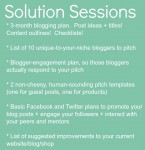
When I do Clever Sessions, I help my clients with all sorts of things.
We talk social media. We come up with ideas for info products. We wax philosophical on the merits of traffic-driving posts versus personal essays on important, thought-provoking topics.
Regardless of the client or topic, one questions almost always comes up:
“How much traffic/followers/subscribers do I need before I can ________________?”
And while I do have a pragmatic, number-based answer to that question, I also have a much healthier, sanity-saving response.
You will be about a million times happier if you track your efforts rather than your accomplishments.
This is true for many reasons.
1. As with most things in life, the only thing you can control is yourself
You can’t control if something you write goes viral. The biggest traffic spike that Yes and Yes ever received was when Reddit thought I was the Ermagerd girl. Shockingly enough, I did not build ‘be mistaken for internet meme’ into my marketing plan. You can control how often you post. You can control how much time you spend on Twitter befriending awesome people. You can control the topics you write about.
You can’t really control who links to you, who retweets you, who likes your funny cat photos on Facebook. You can make it significantly more likely that people will link to you and like your stuff, but you can’t really make anyone do anything.
2. Most goals are reached really, really slowly with a lot of hard work
About 11,000+ people read my blog Yes and Yes every day. Which is great!
But.
I’ve been getting paid to write since I was 20 and I’ve been posting seven days a week for five plus years. If I’d been working towards the goal of 10,000 daily readers when I started my blog I would have given up a 4.75 years ago. (Also: I would probably have drown myself in a sea of noodles and butter but that’s beside the point.)
3. Most accomplishments probably don’t feel the way you’d expect
When you’ve been working towards one goal for months and months (or years and years) you might just come to hate that goal. Or by the time you reach it, you’ve seen it looming in the distance for six months and it’s not particularly surprising or joy-making.
When I handed in the final paper for my M.A. I felt super glad it was over. And then I went out for pizza with my boyfriend. When I signed with a literary agent, I felt nervous and all “Welp, I guess this is what I’m doing with the next two years of my life. So that six-week trip to Russia and Mongolia is out of the picture.”
4. You’ll have a lot more efforts than accomplishments - so you’ll feel happier when you track them
Two scenarios.
What you say: ”I’ll keep track of how many new clients I get!”
How you feel: “Sooooooo, three months and I’ve only landed one new client. I’m a failure, I hate everything, and I should go drown myself in a pool of butter and noodles.”
What you say: “I’ll keep track of how many potential clients I pitch!”
How you feel: “Wow! I pitched five potential clients this month! I’m about a million times braver than I was last month and my presentations are heaps smoother. I’m getting better at dealing with rejection and my pitches are getting tighter and smarter each time.”
See the difference?
Lastly - and most importantly obviously - regular efforts lead to accomplishments. If you focus on little, day-by-day steps the big stuff will take care of itself.
What regular efforts are you taking that you can track? How do you keep from getting discouraged?
photo by la farfalla // cc














17 comments

Comment by Kieran O'ConnorSeptember 11, 2021 at 7:00 am
This makes absolute sense. I think that all too often the entrepreneurial types will judge themselves very harshly and the example given above is spot on.
However, I would add that you have to to be able to differentiate action which is productive against action for its own sake. The person who says “I am keeping busy and the phone will ring next week” is likely to fail in business whereas the person who says “the phone didn’t ring this week so I need to focus my activity to make it ring” will be a success.

Comment by sarahvonSeptember 11, 2021 at 11:45 am
YES! Truth. Watching cat videos as ‘research’ doesn’t count

Comment by JenniferSeptember 11, 2021 at 2:47 pm
Thank you for this! I often forget to look back on all of the hard work it takes to reach (or perhaps not quite reach) my goals.

Comment by Andrew LightheartSeptember 11, 2021 at 4:38 pm
This is the best thing I’ve read all day.
Who are you? I think I love you.
*stalks on Twitter*
Butter. Noodles.

Comment by sarahvonSeptember 11, 2021 at 4:49 pm

Comment by ThomasSeptember 12, 2021 at 1:31 am
Great article. You can only control yourself, and if you put in the effort the results will show up. Focusing on the effort keeps tasks manageable, stress lower, and self-esteem higher. It also takes a lot of the pressures of timing and deadlines out of the equation (or at least less of a focus). Thanks for sharing!

Comment by CristinSeptember 12, 2021 at 3:46 pm
I cannot get over how many times both on the small business blog and yes and yes, you point out things that are SO simple and yet I had never thought of. Thank you!

Comment by sarahvonSeptember 12, 2021 at 3:56 pm
Yay! Music to my ears!

Comment by JoannaSeptember 12, 2021 at 9:03 pm
Aw, I love this! I love your “advice” posts. So smart, so down-to-earth. Also also so personable and warm and funny. Yay!

Comment by AmandaSeptember 13, 2021 at 4:21 am
Its taken me a couple of days to reply but ive had this email open for a few days on the “That is awsome so im going to read it when i have zero distractions”
I LOVED this post. I am studying for a bigger goal but the goal requires lots of hard work, practice and study study study. I am CRAP at studying. Absolutely awful. This was such a struggle during school. I have three lots of notes to go through - About 60 pages all together. They sit on my desk and make me feel so guilty for not looking at them. They taunt me “Another day you and didnt read me” and i hate it. Im a busy mum of two kids and i work. Finding time feel like sometimes it is impossible. But your post moved me. Yes i can do it. Even if its just a tiny tiny bit. That tiny bit is better than nothing for the day.
I went and brought a note book today (which is half why i was waiting to dig right into your post) and ive printed out this post and highlighted all the juicy bits. Each and every day im going to write the date and then what i have done to make my dream come alive. Even if its just a tiny bit. Doing something is better than nothing.
Thank you from the bottom of my heart for this post.

Comment by sarahvonSeptember 13, 2021 at 4:45 am
Oh, gosh! My absolute pleasure! <3

Comment by AnnaSeptember 13, 2021 at 2:15 pm
I find this to be true in my personal life, too. It is much more motivating for me to make my goal “exercise 3x a week” instead of “lose ten pounds.” You can’t totally control what the outcome is, but you can control what you do.

Comment by AkirahSeptember 13, 2021 at 10:27 pm
This is fabulous. Exactly what I needed to read this week. Thank you.

Comment by ClaireSeptember 19, 2021 at 6:44 am
I had to wait a few days until I could get around the crazy internet blocks of where I’m currently living to comment, but waiting was worth it. I just gotta say, this post was fabulous. Like, bookmark and save on my desktop fabulous.

Comment by sarahvonSeptember 19, 2021 at 12:40 pm
Thank you so much!

Comment by KarnSeptember 20, 2021 at 10:34 pm
It seems to me, with the people I work with, all they do is focus on how much effort they put into something, in the absence of results. This is so pervasive it seems like a universal human tendency.
I could not disagree with this article more. In the end, results are *all* that matter. If you want to chunk up your larger goals into smaller goals, that’s probably a great idea. If you want to spend a lot of time spinning your wheels, focus on how much effort something takes. If you want to succeed, in business and in life, you should never take your eye off the prize.

Comment by StephSeptember 24, 2021 at 2:16 am
YES. This makes so much sense Sarah, thank you! I’ve just read it three times. I hope your insanely-smart advice sinks in because I’m just two months in to my new website and I’m in that awful stage of checking my analytics every day, my followers, my comments…. etc etc. But it doesn’t even mean anything!
Now you’ve given me something REAL to track. Thanks.